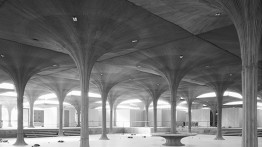Victor Lundy: Artist Architect
Mon, Mar 18, 2019 9am - Sun, Apr 7, 2019 5pm

Photograph by George Cserna. Avery Architectural & Fine Arts Library, Columbia.
This exhibition spotlights the extraordinary work of Victor Lundy, an important but under-recognized postwar American architect. In recent years, however, and with the release of a new monograph released by Princeton Architectural Press, Victor Lundy: Artist Architect, his work has achieved wider recognition. Known for his material innovation, sloping roof structures, curving walls and distinctive columns, Lundy was both a visionary builder and creative artist. This exhibition highlights nine of Lundy’s projects from Sarasota, Florida to Colombo, Sri Lanka. Spanning diverse programs for churches, an embassy, commercial and civic spaces, private homes, and refreshment stands for the 1964-65 World’s Fair, the exhibition is part of a growing awareness of Lundy’s significant contributions to midcentury American architecture.
In conjunction with the exhibition, Donna Kachmar, editor of Victor Lundy: Artist Architect will lecture on Lundy’s work on Thursday, March, 28th at 6:30pm. More info can be found here.
Third Floor Hallway Gallery
Open to Students, Faculty and Staff
View the full 2019 Spring Lectures and Events List.
Located at 7 East 7th Street, between Third and Fourth Avenues




